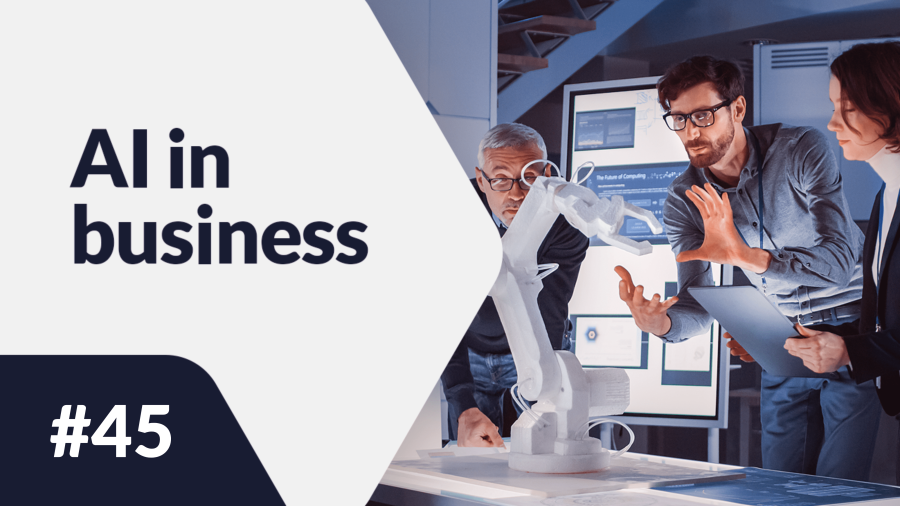AI and business ethics – table of contents:
What is AI business ethics?
AI ethics is about how AI-based technologies should be designed, developed, used and managed responsibly and following human values.
AI ethics in a business context mainly includes issues such as:
- Protecting privacy and respecting users’ rights regarding how their data is used,
- Robustness of solutions, including avoiding errors resulting from the publication of unprepared solutions,
- non-discrimination, that is, taking care of the data on which artificial intelligence is taught to avoid reproducing biases in algorithms and machine learning models, as well as carefully testing the solutions introduced,
- the responsibility of companies for the solutions they create, which includes problems related to privacy, how data is handled, misinformation and manipulation of user behavior, and The impact of artificial intelligence on the environment, i.e., the drive to create the most energy-efficient solutions possible.
How to ethically implement artificial intelligence in business?
The key to the ethical use of AI in business is to create transparent solutions, that is, to strive for full transparency in how AI solutions are created and what data they use. A separate issue is maintaining transparency, that is, regularly reviewing and updating the performance of AI-based solutions to ensure that there is no unintentional discrimination or privacy violations.
Another important aspect is to ensure that employees and customers are aware of how the company uses AI and the potential consequences of that use. These should be clearly described in the AI service regulations available to users.

Source: DALL-E 3, prompt: Marta M. Kania (https://www.linkedin.com/in/martamatyldakania/)
To work on AI ethics, Frontier Model Forum was established in July 2023, which focused on ensuring the safe and responsible development of AI models. It was created by leading companies developing artificial intelligence, namely:
The Forum’s goals include:
- Supporting the safe and responsible development of AI models,
- Recognizing best practices in the field,
- Promoting AI security research and
- Facilitating information sharing between companies and governments.
The forum plans public consultations and discussions with governments on how to effectively collaborate on the future fate of artificial intelligence, as well as developing applications of artificial intelligence in close connection with AI ethics. For example, its application in areas such as climate change mitigation, cancer detection, and combating cyber threats.

Source: Frontier Model Forum (www.frontiermodelforum.org)
Why invest in business ethics solutions?
Investing in ethical AI is crucial not only from a moral standpoint but also for strategic business benefits. According to Google research, 86% of consumers prefer to spend money with companies that represent their values. The key reasons to consider implementing ethical AI are:
- Legal compliance – An ethical approach to AI helps comply with growing data protection and privacy regulations.
- Avoiding reputational risk – misuse of AI can lead to serious reputational damage. For example, IBM has been sued for allegedly misusing data, Optum has been accused of creating algorithms that favor white patients, and Goldman Sachs has been accused of gender discrimination in lending.
- Long-term cost-effectiveness – ethical AI prevents costly mistakes, yielding long-term benefits.
- Social responsibility – ethical use of AI is a reflection of a company’s social responsibility.
AI business ethics issues
The most well-known example of problems with the ethical application of AI concerns unauthorized user data: the case of Facebook, which became infamous for giving Cambridge Analytica, a politically entangled company, access to the personal data of more than 50 million users. This situation demonstrates the risks associated with the misuse of personal data and points to the need for strong ethics and accountability in AI.
The second threat related to AI ethics in business is the issue of energy consumption. Although the exact amount of energy required to train the GPT-4 model, used in paid versions of ChatGPT and BingChat, has not been publicly disclosed, it contains more than 175 billion parameters and has been trained on more than 45 TB of data.
The training process required analyzing huge amounts of data and optimizing the model’s parameters while maintaining and updating the operation of GPT-4 entails the need for intensive use of computing power and also results in high energy consumption. Therefore, one of the important problems of AI ethics is to use in business artificial intelligence with the minimum requirements necessary to perform the planned tasks, instead of using for all purposes the most modern but energy-expensive models.
The third, very important problem is disinformation and “deepfake.” Here the main problems of AI ethics are:
- tagging content created by generative artificial intelligence,
- control over published materials – that is, “fact-checking” avoids the unintentional spread of disinformation. It is important to remember that artificial intelligence can “hallucinate,” i.e. create highly probable but untrue content,
- not using images of famous people – who, thanks to their accessibility, are very easily cast as video narrators speaking any lines.
AI and business ethics – summary
Investing in ethical AI is not only a moral obligation, but also a strategic business decision. For small and medium-sized enterprises, this means not only protecting privacy and avoiding discrimination but also paying attention to the accessibility of AI solutions for all users. It is also significant to train employees in ethical AI so that they understand both the capabilities and limitations of these technologies.
Investing in ethical AI solutions builds trust not only among customers but also among investors and partners, becoming the foundation for long-term relationships based on transparency and integrity. A company’s long-term vision for AI ethics should include continuous adaptation of ethical guidelines to new technological developments and social changes that seem to be an inevitable result of AI development, to ensure responsible and sustainable application of AI in business.

If you like our content, join our busy bees community on Facebook, Twitter, LinkedIn, Instagram, YouTube, Pinterest, TikTok.
Author: Robert Whitney
JavaScript expert and instructor who coaches IT departments. His main goal is to up-level team productivity by teaching others how to effectively cooperate while coding.
AI in business:
- Threats and opportunities of AI in business (part 1)
- Threats and opportunities of AI in business (part 2)
- AI applications in business - overview
- AI-assisted text chatbots
- Business NLP today and tomorrow
- The role of AI in business decision-making
- Scheduling social media posts. How can AI help?
- Automated social media posts
- New services and products operating with AI
- What are the weaknesses of my business idea? A brainstorming session with ChatGPT
- Using ChatGPT in business
- Synthetic actors. Top 3 AI video generators
- 3 useful AI graphic design tools. Generative AI in business
- 3 awesome AI writers you must try out today
- Exploring the power of AI in music creation
- Navigating new business opportunities with ChatGPT-4
- AI tools for the manager
- 6 awesome ChatGTP plugins that will make your life easier
- 3 grafików AI. Generatywna sztuczna inteligencja dla biznesu
- What is the future of AI according to McKinsey Global Institute?
- Artificial intelligence in business - Introduction
- What is NLP, or natural language processing in business
- Automatic document processing
- Google Translate vs DeepL. 5 applications of machine translation for business
- The operation and business applications of voicebots
- Virtual assistant technology, or how to talk to AI?
- What is Business Intelligence?
- Will artificial intelligence replace business analysts?
- How can artificial intelligence help with BPM?
- AI and social media – what do they say about us?
- Artificial intelligence in content management
- Creative AI of today and tomorrow
- Multimodal AI and its applications in business
- New interactions. How is AI changing the way we operate devices?
- RPA and APIs in a digital company
- The future job market and upcoming professions
- AI in EdTech. 3 examples of companies that used the potential of artificial intelligence
- Artificial intelligence and the environment. 3 AI solutions to help you build a sustainable business
- AI content detectors. Are they worth it?
- ChatGPT vs Bard vs Bing. Which AI chatbot is leading the race?
- Is chatbot AI a competitor to Google search?
- Effective ChatGPT Prompts for HR and Recruitment
- Prompt engineering. What does a prompt engineer do?
- AI Mockup generator. Top 4 tools
- AI and what else? Top technology trends for business in 2024
- AI and business ethics. Why you should invest in ethical solutions
- Meta AI. What should you know about Facebook and Instagram's AI-supported features?
- AI regulation. What do you need to know as an entrepreneur?
- 5 new uses of AI in business
- AI products and projects - how are they different from others?
- AI-assisted process automation. Where to start?
- How do you match an AI solution to a business problem?
- AI as an expert on your team
- AI team vs. division of roles
- How to choose a career field in AI?
- Is it always worth it to add artificial intelligence to the product development process?
- AI in HR: How recruitment automation affects HR and team development
- 6 most interesting AI tools in 2023
- 6 biggest business mishaps caused by AI
- What is the company's AI maturity analysis?
- AI for B2B personalization
- ChatGPT use cases. 18 examples of how to improve your business with ChatGPT in 2024
- Microlearning. A quick way to get new skills
- The most interesting AI implementations in companies in 2024
- What do artificial intelligence specialists do?
- What challenges does the AI project bring?
- Top 8 AI tools for business in 2024
- AI in CRM. What does AI change in CRM tools?
- The UE AI Act. How does Europe regulate the use of artificial intelligence
- Sora. How will realistic videos from OpenAI change business?
- Top 7 AI website builders
- No-code tools and AI innovations
- How much does using AI increase the productivity of your team?
- How to use ChatGTP for market research?
- How to broaden the reach of your AI marketing campaign?
- "We are all developers". How can citizen developers help your company?
- AI in transportation and logistics
- What business pain points can AI fix?
- Artificial intelligence in the media
- AI in banking and finance. Stripe, Monzo, and Grab
- AI in the travel industry
- How AI is fostering the birth of new technologies
- The revolution of AI in social media
- AI in e-commerce. Overview of global leaders
- Top 4 AI image creation tools
- Top 5 AI tools for data analysis
- AI strategy in your company - how to build it?
- Best AI courses – 6 awesome recommendations
- Optimizing social media listening with AI tools
- IoT + AI, or how to reduce energy costs in a company
- AI in logistics. 5 best tools
- GPT Store – an overview of the most interesting GPTs for business
- LLM, GPT, RAG... What do AI acronyms mean?
- AI robots – the future or present of business?
- What is the cost of implementing AI in a company?
- How can AI help in a freelancer’s career?
- Automating work and increasing productivity. A guide to AI for freelancers
- AI for startups – best tools
- Building a website with AI
- OpenAI, Midjourney, Anthropic, Hugging Face. Who is who in the world of AI?
- Eleven Labs and what else? The most promising AI startups
- Synthetic data and its importance for the development of your business
- Top AI search engines. Where to look for AI tools?
- Video AI. The latest AI video generators
- AI for managers. How AI can make your job easier
- What’s new in Google Gemini? Everything you need to know
- AI in Poland. Companies, meetings, and conferences
- AI calendar. How to optimize your time in a company?
- AI and the future of work. How to prepare your business for change?
- AI voice cloning for business. How to create personalized voice messages with AI?
- Fact-checking and AI hallucinations
- AI in recruitment – developing recruitment materials step-by-step
- Midjourney v6. Innovations in AI image generation
- AI in SMEs. How can SMEs compete with giants using AI?
- How is AI changing influencer marketing?
- Is AI really a threat to developers? Devin and Microsoft AutoDev
- AI chatbots for e-commerce. Case studies
- Best AI chatbots for ecommerce. Platforms
- How to stay on top of what's going on in the AI world?
- Taming AI. How to take the first steps to apply AI in your business?
- Perplexity, Bing Copilot, or You.com? Comparing AI search engines
- ReALM. A groundbreaking language model from Apple?
- AI experts in Poland
- Google Genie — a generative AI model that creates fully interactive worlds from images
- Automation or augmentation? Two approaches to AI in a company
- LLMOps, or how to effectively manage language models in an organization
- AI video generation. New horizons in video content production for businesses
- Best AI transcription tools. How to transform long recordings into concise summaries?
- Sentiment analysis with AI. How does it help drive change in business?
- The role of AI in content moderation


















